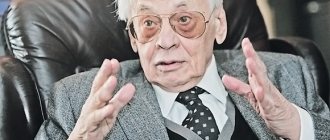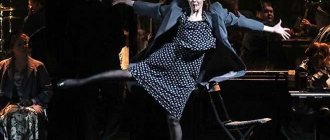Biography
Vladimir Zeldin was born in the Tambov region into a creative family. His father, Mikhail Evgenievich, graduated from the Moscow Conservatory in trombone class, as well as the conducting department. Mom - Nina Nikolaevna - was a music teacher.
In 1920, due to the Civil War, Vladimir’s family moved to Tver, and in 1924 to Moscow. A few years later, Vladimir Zeldin’s father died, and soon his mother.
For a long time, Vladimir dreamed of ballet, even tried to enter the Bolshoi Theater Choreographic School in the character dance department when he was 12 years old. But the father was against this hobby of his son.
The future actor studied at a paramilitary school on Taganka. Like all cadets, he played a lot of sports there - football, volleyball, tennis, and also skiing and skating. After graduating from school, Vladimir wanted to become a military man - to join the navy. But due to vision problems, this dream turned out to be impossible.
Therefore, the future actor went to work as a mechanic at a factory. There at the enterprise there was an amateur club, where Zeldin performed on stage in his free time.
When Vladimir saw that the production and theater workshops at the MGSPS Theater (now the Mossovet Theater) were taking an acting course, he decided to try to enroll there too. During the exams, he read poems by Bezymensky and stories by Natalya Konchalovskaya. To Vladimir’s surprise, he was accepted into Evgeniy Lepkovsky’s course.
Not far from the Bogolyubsky Cathedral, at the intersection of Gerasimov Street and Revolutionary Street, today you can see a small one-story pink house. This house was built in the late 1930s for Alexandra Semyonovna Tikhonova (1893–1968), I.V.’s assistant. Michurina. After her death, the famous breeder scientist, Doctor of Agricultural Sciences, professor, academician Stanislav Pavlovich Yakovlev, the son of associate I.V., lived in the house. Michurin, Academician of VASKhNIL Pavel Nikanorovich Yakovlev.
And at the beginning of the twentieth century, on the corner of Voznesenskaya (now Revolyutsionnaya) and Lebedyanskaya (now Gerasimova) streets there was a two-story wooden house of the merchant of the 2nd guild S.I. Popov - the owner of a tobacco factory, an active participant in the right-wing monarchist movement in the Tambov province, a comrade of the chairman of the Kozlov Union of Russian People, in which, since 1915, the bandmaster of the 39th Tomsk Infantry Regiment, Mikhail Evgenievich Zeldin, rented an apartment of three rooms for his family.
This house was also famous for the fact that it formerly housed the school of the Kozlov branch of the Union of Russian People. As the Kozlovskaya Gazeta says in 1912, the School of the Union of Russian People was transferred from its previous premises to the house of Stepan Ivanovich Popov, on Voznesenskaya (Revolutionary) Street (opposite the post office) On this occasion, on Sunday, August 19 (September 1), 1912, a prayer service was served, which was performed by: G. Zhemchuzhnikov, Zemyatchinsky and Peskov (the school’s teacher of the law). The choir sang under the direction of N.I. Sidelnikova. The celebration was attended by: members of the Council, headed by the chairman - the leader of the nobility V.N. Snezhkov, G.V. Valedinsky and the mass of the public. After the prayer service, guests were offered a cold appetizer. The council and the ladies' patriotic circle offered S.I. Popov's bread and salt. E.F. Patsukova gave a welcoming speech on the occasion of the housewarming. The ladies' circle also honored V.N. with bread and salt. Snezhkova. There haven’t been classes at school yet, and they will start at the same time as other schools.”
The state archive of the Tambov region in the Kozlov Commercial School fund contains the file of student Georgy Mikhailovich Zeldin. The petition of the conductor's wife Anna Nikolaevna Zeldin for admission to the junior preparatory class of her son Georgy, dated May 15 (28), 1916, indicates the family's place of residence: Lebedyanskaya Street, Popov House, Zeldin's apartment.
The house in which the Zeldin family lived was destroyed during the revolutionary events. In 1929, the city municipal department announced through the newspaper “Nasha Pravda” a competition for the development of three estates, including the same place in the 29th block at the corner of Lebedyanskaya and Revolyutsionnaya streets, where S.I.’s house was located. Popova."
Another Kozlov address of the apartment of M.E. Zeldin’s family is known. In the address calendar of employees of the Tambov province for 1914, we find the address of the bandmaster of the Tomsk Infantry Regiment M.E. Zeldina - Kozlov Lebedyanskaya street Krotov's house.
What do we know about Mikhail Evgenievich Zeldin. Born in 1876 in Belarus into a Jewish family. The surname Zeldin comes from the Jewish female name Zelda, which in turn comes from Old German and means “happiness.” The ending -in denotes belonging. Thus, Zeldin is translated as the son of Zelda. To receive a musical education, Mikhail Evgenievich converted to Orthodoxy. As Vladimir Mikhailovich Zeldin recalls, despite the Jewish roots, the way of life in the family was ordinary, Russian, Orthodox and completely patriarchal - with fasting, Easter cake, a Christmas tree and Sunday trips to church. In 1900, Mikhail Evgenievich graduated from the Moscow Conservatory (XXXI graduation) in the trombone class of Professor Christopher Ivanovich Bork. (1898-1899 academic year - solfege 1st year professor Nikita Semenovich Morozov - Alexander Zeldin; attended the pedagogical piano class of student S.E. Terletskaya).
Where could a young Jewish musician and a hereditary honorary citizen, the daughter of a Kozlov merchant of the 2nd guild, Anna Nikolaevna Popova, meet and fall in love with each other? It is quite possible that the answer to this question will be given to us by a list of students from the report of the Moscow Conservatory, which indicates that Anna Nikolaevna Popova studied (singing - Professor Camillo Everardi (2nd half of the 1897-1898 academic year; 1st half of the 1898-1899 academic year ; Professor U. Masetti 1st half of the 1899-1900 academic year; compulsory piano - Professor E.L. Langer).
Although Vladimir Mikhailovich himself said about his mother that she got married very young, but already had the profession of a primary school teacher. On April 17 (30), 1908, their son Georgy was born, baptized on April 29. In the metric book of the Kharkov Archangel Michael Church about those born in 1908, the following is recorded: “Rank, first name, patronymic and surname of the parents, and what religion - Moscow province from the burghers of Sergiev Posad, reserve non-commissioned officer Mikhail Evgeniev, son Zeldin (32 years old) and legitimate his wife Anna Nikolaeva daughter (nee Popova (24 years old) (1884-1931); both Orthodox. Rank, first name, patronymic and surname of the recipients - cornet of the 1st Orenburg Cossack Regiment Mikhail Konstantinov son Nikolaev and wife of the commander of the 1st Orenburg Cossack Regiment regiment Ekaterina Ignatieva daughter of Nikolaev. The sacrament of baptism was performed by priest Peter Skubachevsky with psalm-reader-deacon Vasily Sergeev. This marriage was Mikhail Evgenievich’s second. From his first marriage he had a daughter, Elena.
In addition to their son Georgy, Mikhail Evgenievich and Anna Nikolaevna had daughters Nina and Irina, and the youngest Vladimir (January 28/February 10, 1915 in Kozlov).
Mikhail Evgenievich left a significant mark on the history of the village of Yazykovo (Yazykovo-Tenkovo volost, Simbirsk province and district). The owner of the Yazykovskaya cloth factory, Mikhail Fedorovich Stepanov, at the request of his singer wife, Natalya Osipovna, decided to create a brass band from the children of his factory workers. We purchased a set of wind instruments, recruited 65 teenagers and invited 6 professional musicians from France to teach children. The permanent conductor, a graduate of the Moscow Conservatory, Mikhail Evgenievich Zeldin, arrived from the capital. They began to study music every day, and for missing classes they could be fined. Having perfect pitch, Mikhail Evgenievich noticed the slightest falsehood when the orchestra played. And it was bad for those who, for some reason, could not play this or that musical phrase. Less than a year had passed, and the orchestra had advanced so much in its performance skills that, in addition to marches, polkas and waltzes, it began to play complex works that required a lot of preparation. But not everyone liked the strict discipline in the orchestra. Some of the orchestra members even wanted to let the “red rooster” under the orchestra room, having persuaded the watchman. Creeping up to the windows of the orchestra in the evening, they heard music from there, which they really liked. Fragments from the opera by M.I. Glinka "Life for the Tsar". The music of the wonderful Russian composer stopped the men and forced them to abandon their plans.
And yet it is likely that this incident forced Mikhail Evgenievich to return to Moscow. Instead of Zeldin, Loginov was invited from St. Petersburg to the position of head of the group, who also organized a balalaika orchestra at the factory. Soon both ensembles performed in Simbirsk and had great success. However, Loginov was recalled to the orchestra of the St. Petersburg Imperial Theater, and without him the orchestra in Yazykovo almost disintegrated. Concerned about this, the manufacturer Stepanov persuaded Mikhail Zeldin to return to the orchestra. 1910-1914 was the time of the real heyday of the team. It consisted of 70 musicians who played complex classical music. Stepanov spared no expense for the orchestra. Mikhail Fedorovich purchased a set of instruments from the factory of the musical master Chervenago in Kyiv, which cost a lot of money. In Kyiv, the factory of the company "Ekstrafon" released records on which the orchestra performed "Anitra's Dance" and "In the Cave of the Mountain King" from Edvard Grieg's suite "Peter-Gynt".
In 1911 M.F. Stepanov chartered a ship and sent his musicians to the cities of the Volga region. Then there were Rostov, Kyiv, Odessa, Riga, Petrograd. In 1913, the orchestra toured Moscow. The skill of the performance surprised connoisseurs: “With such an orchestra of working guys, it’s not a shame to go abroad.” Critics ranked the language orchestra “as an institution with serious goals, which puts art in the foreground, not amateur entertainment.”
Visited the Stepanovsky orchestra and the city of Kozlov. in Kozlovskaya Gazeta No. 7 of January 23 (February 5), 1913 : “On Wednesday, February 6 (19), 1913, a concert of a brass band consisting of 70 cloth factory workers will take place in the hall of a commercial school under the leadership of M.E. Zeldin."
“About this concert in the hall of a commercial school by the workers of the manufacturer M.F. Stepanov, as about music, we can say that many of those who attended the concert heard such music for the first time,” wrote the correspondent of the Kozlovskaya Gazeta, “but we are not interested in a detailed description of all the details and equipment and musical instruments of the performers, and the orchestra itself is not represents something better that could not be wished for. We look at Mr. Stepanov's orchestra as a vivid example of the fact that simple, gray Russian people are not as stupid and untalented as they are believed to be. In composing the orchestra, Mr. Stepanov, of course, could attract people more cultured than his factory workers, but Mr. Stepanov organized the orchestra from a class that is looked upon unkindly in our country - from the working class, and, taking it all over Russia , everywhere and everywhere emphasizes: “composed exclusively of workers.” The underlined words clearly show how we Russian people look at our culture. For us, it is a wonder if the simple working class acts as a performer of such highly artistic works as the overture to the opera “Tannhäuser” by Wagner and “Italian Capriccio” by Tchaikovsky. Transporting his orchestra from city to city, Mr. Stepanov does not represent the leader of the bear, but on the contrary, he makes us, after listening to the performers of his orchestra, even more convinced that the Russian common people also contain great talents that can give glory to their homeland , but that these talents are only sleeping: sprinkle them with living water and they will quickly manifest their activity.”
In December 1913, the former conductor of the orchestra of the Stepanov factory, M.E., became a conductor in the orchestra of the Tomsk regiment, stationed in the city of Kozlov. Zeldin. About this event, the Kozlovskaya Gazeta published a note on December 11 (24), 1913, entitled “The New Bandmaster,” in which it gave a very flattering assessment of the work of M.E. Zeldin. “The orchestra, during the management of Mr. Zeldin,” it was written in the newspaper, “reached such perfection that Stepanov decided to go with it to Moscow in 1911 and gave a number of concerts there. Critics of the Moscow press are usually too demanding and picky to the point of pettiness; Stepanov’s orchestra was unanimously reviewed with enthusiasm and its success was entirely attributed to Mr. Zeldin. Of all the best brass bands existing in Russia, the music critic of the Russian Word Sakhnovsky considers only the St. Petersburg Imperial Brass Band to be equal to Stepanov’s orchestra. All critics give Zeldin great credit for his artistic repertoire, which he, in contrast to all other brass bands, strictly adheres to. Stepanov’s orchestra visited us in Kozlov last year and gave one concert under the baton of Zeldin. The impression of this wonderful concert was so strong that we have firmly retained it to this day. The artistic performance was greatly aided by the rather diverse composition of the orchestra's instruments. We have no doubt that Mr. Zeldin will try to reform the composition of the Tomsk Regiment Orchestra on the model of the Stepanovsky Orchestra - he will increase the number of clarinets and flutes, get a full set of horns, add trombones and tuba-bass, and maybe oboes, bassoons, bass clarinets and saxophones. It will also be good if the last two instruments are purchased at least in smaller quantities compared to the Stepanovsky Orchestra. If the regiment’s leadership meets him halfway in this direction, then the Tomsk regiment, and with it Kozlov, will have the best orchestra in Russia.”
From January 1 (14), 1914 in Kozlov at the music school of Maria Yuryevna Bologovskaya, under the direction of M.E. Zeldin opened a choir class with an annual fee of 5 rubles.
With the beginning of the First World War, the bandmaster of the 39th Tomsk Infantry Regiment, non-commissioned officer M.E. Zeldin and his regiment go to the front. The family remained in Kozlov. After the February events of 1917, Mikhail Evgenievich returned to Kozlov, where, despite difficult conditions, he continued to do what he loved.
In “Kozlovskaya Gazeta” No. 80 dated July 7 (20), 1917, two notes were published: 1) Conductor of the orchestral and choral society M.E. Zeldin invites women and men who want to learn singing to enroll in the society. Training is free. You can sign up with M.E. Zeldin, corner of Lebedyanskaya (Gerasimov) and Voznesenskaya (Revolutionary) streets, former Popov’s house. 2) In the railway orchestral circle, organized by M.E. Zeldin, theory classes began. Negotiations are underway with Moscow companies to purchase instruments.
In 1917, Mikhail Evgenievich took the initiative to create an orchestral and choral society in Kozlov. This idea gradually transformed into the creation of the Kozlov Music Society. It became the basis for the creation of the People's Conservatory in Kozlov in 1918. M.E. Zeldin was elected chairman of the pedagogical council. The conservatory was located in the building of the Yuryevs' icon-painting workshop on Sennaya Square (secondary school No. 16 has been located in this building for many years).
The first meeting of the pedagogical council of the People's Conservatory took place on March 24 (April 6), 1918. It was attended by: M.E. Zeldin, E.O. Nariche, T.I. Chumakova, G.I. Kaufman, V.F. Verzhbitsky, P.A. Dorokhov, P.P. Terekhov, S.M. Orlyankin, Volotsky, vr. Secretary A.N. Zeldin.
Listened to: 1) Election of the chairman of the pedagogical council.
Resolved: M.E. was unanimously elected chairman of the pedagogical council. Zeldin. Done.
Listened to: 2) How a conservatory should exist and with what funds.
Resolved: The Kozlov People's Conservatory is an autonomous institution of the Commissariat of People's Education.
Listened to: 3) Remuneration for teachers and the chairman of the pedagogical council. To the secretary. Doormen.
Resolved: It was decided to draw up a detailed estimate and consider the work to be no less than 3 hours, no more than 5 hours, and remuneration would be distributed according to these hours. 3 hours a day - 250 rubles; 4 hours a day – 326 rubles; 5 hours – 400 rub. Prof. Nariche and Pred. ped. The Council decided to separately apply for Zeldin and Chumakova and give the secretary 250 rubles. – 2 doormen – 1300 rub. when the apartment is ready.
4) We listened: about issuing certificates to students to attend the conservatory.
They decided to order such certificates and issue them to students who paid the fee. Done.
5) Listened: About the conservatory program.
We decided to accept students without any musical training and gradually expand the program. Done.
6) On the possibility of eliminating incapable students.
It was decided: after a detailed test and by decision of the pedagogical council, the incapable student is dismissed.
7) About the acquisition of sheet music and minor music. Tool accessories.
Decided: In order to save money for students and affordability of prices, it was decided to purchase sheet music and small musical accessories from the Conservatory.
In April 1919, the anniversary of the People's Conservatory was celebrated in Kozlov. The Proletarskaya Mysl newspaper tells us about this. The main and leading role in the organization of the People's Conservatory M.E. was noted here. Zeldin. The article said: “On April 7, 1918, the People's Conservatory opened in Kozlov. The thought, initiative and first stone in the creation of the People's Conservatory belongs to Comrade. Zeldin M.E., who even before the department of public education, together with cultural education. a commission under the Council of Deputies laid a solid foundation for the future great edifice of folk aesthetic creativity. Since that time, he has been tirelessly working inside the conservatory itself. From the very first days there were many listeners at the People's Conservatory. And in the summer we have already seen choral singing courses organized for teachers of rural schools. Next, the Conservatory undertakes to issue and supply schools in the county with the necessary musical works - schools, sheet music, etc. Currently, there are about 330 students at the Conservatory. The People's Conservatory is very popular among the working population. Unfortunately, it is not possible to satisfy the demand and desire of the population to study at the Conservatory due to the lack of the required number of teachers, as well as suitable premises. There are more entries in the queue than there are listeners. Under favorable conditions, the number of listeners would be more than 1000 people. Now the People's Conservatory does not have a specially adapted room for it, because the former premises are occupied as an infirmary by the headquarters of the Southern Front and are currently huddled in the premises of the 6th Soviet school of the 2nd level. The anniversary celebration took place in this temporary premises and was purely family in nature: only students of the People's Conservatory and teachers were present. From the department of public education there were the head of the department, Comrade. IN AND. Dyakin and head sub-department of comrade S.A. Babylin. The opening of the celebration was started by the speech of Comrade. M.E. Zeldin. The head of the department of public education welcomed Comrade. Zeldin and those present on the occasion of the celebration. The concert department began with the International (choir and orchestra). Then the following were performed: 1) quartet variations on a Russian theme (1st variation by Artsybushev, 2nd by Scriabin, 3rd by Glazunov, 4th by Rimsky-Korsakov, 5th by Lyadov, 6th by Vitol, 7th - Blumenfeld, 8th - Ewald, 9th - Winkler and 10th - Sokolov). Performed by: J. Mikhnovsky (1st violin), N. Shabunin (2nd violin), G. Kaufman (viola) and M. Kaufman (cello). 2) Ernsefld “Lullaby”. Performed by J. Mikhnovsky. 3) Makarova-Sikorskaya performed some passages from Robert the Devil, several Russian songs and “My Little One” by the muses. Gomez. 4) Beethoven. Trio. Performed by: N. Arkhangelsky, J. Mikhnovsky, M. Kaufman. 5) The choir performed: 1) “Workers’ Palace” by music by Ozolin, lyrics by Pomeranian; 2) “Jokes” by Nikolsky, 3) Kamarinsky translation. Schubert and 4) “Joke in the Woods” music. Ivanova. The concert part went very well and brought many pleasant moments to the audience. After the concert there was dancing. Course participants arranged tea and dinner for those present. We wish that the work of the People’s Conservatory deeply captures the proletarian masses of the population and widely spreads its educational aesthetic activities.”
Two months after the celebration of the anniversary of the People's Conservatory, the same newspaper “Proletarskaya Mysl” will tell how the public examination of students took place. According to the reviewer, this exam was not the best, and not in terms of the quality of the music, but in terms of the non-communist choice of repertoire: “On Monday, July 7, a public demonstration of the musical and pedagogical works of students of the folk conservatory of the Kozlovsky department of the folk music took place at the Moscow Theater education. The evening begins with an international. The sounds of the anthem of the proletariat flow smoothly from the lips of young singers. Apparently a lot of work went into the choir. The impression is most pleasant. The orchestra performances are also successful. Bach’s “Gavotte” is also understandable, and the audience listens with pleasure to Mozart’s “Turkish March”. Kozhevnikova’s pleasant voice and her performance of Schubert’s romance “A Girl’s Complaint” was a pleasure to listen to. The only pity is that the voice is still so weak that it is not enough for half the audience. Mendelssohn's Caprice and Chopin's waltzes, performed by student Solopanov from memory, were successful as illustrative examples of the technique achieved at the conservatory. But the conservatory with Glinka’s romance got into a puddle. It’s time for workers publishing proletarian culture to know that there is no art for art’s sake and no matter how well the romance from Glinka’s opera “A Life for the Tsar” is performed, it will always cause a negative attitude from the proletarian masses. Listening to their own family, the bourgeoisie present laughed with pleasure, and only respect for the conservatory workers restrained the proletarians from expressing their indignation at the performed thing right there on the spot. The singer has finished - the father will not come, his death will end! Let us also hope that we will not hear the burps of tsarism again in the proletarian theater. It's time to go to the archives! “The Organ Grinder's Song” by Tchaikovsky has already become very sticky. Gameau's "Ancient Dance" was incomparably better. The performers undoubtedly have talent. The student of Korolev, performing Vieton’s “Ballad,” lied a little, but if we take into account that he practiced for only three months, then he played wonderfully. Undoubtedly, student Ivanova has a pleasant voice (there was no need to worry so much), but the production is extremely bad, so the voice breaks off. It would not hurt to pay attention to her teacher, and if the latter is not capable, then give her resignation, but not allow her to spoil her voice. But Violetta’s aria from Verdi’s La Traviata was performed poorly by Gordievskaya’s student. Anything you want, but not musicality. As an actress she would have been successful. The facial expressions are wonderful. Suitable for operetta, but not for opera. Student Nikolaev performed Radames's aria from the opera "Aida" quite passably. Student Nikolaev played Grieg’s “Carnival” with great understanding. The choir performed their numbers well. We listened with pleasure to Ozolin’s “Workers’ Palace”. It should be noted that student Surenskaya, with her good accompaniment, greatly contributed to the success of the performers. The overall picture was spoiled by remnants of the old - knixens. If not for the mistake with the royal opera, the evening would have to be considered a success. There is material. We just need more attention from teachers and more principled restraint when selecting things. Then Kozlov’s proletariat will be able to be proud of their conservatory.”
Today we do not know how this assessment of the exam of conservatory students affected the teaching staff, whose chairman was M.E. Zeldin, but the fact remains that in 1919 the People's Conservatory was transformed into a music school. The minutes of the meeting of the school council of the Kozlov People's Conservatory dated August 2, 1919 tell about this. The meeting began at 3 pm old time. Chaired by Ya.L. Mikhnovsky. On the agenda is a report from the emissary of the Tambov district music department on the reorganization of the Kozlov People's Conservatory. About the approval of T.M.O. (Tambov district music) department, its composition and responsibilities. Division of music schools into 1st, 2nd and 3rd levels and higher and public schools. Purpose and programs of public schools. On the opening of a 2nd level music school in Kozlov, reorganizing the Kozlov People's Conservatory into it, which does not fully correspond to a public school, due to the lack of collective education. On approval of the position of the district Commissioner, who will also be the head. 2nd level school. On the invitation and appointment of teachers to the school upon the proposal of the district emissary. The situation regarding schools of the 1st, 2nd and 3rd levels is briefly outlined.
Resolution. “The proposal of head Malykhin to delegate a representative to the center to acquaint him with the existing Kozlov People’s Conservatory in order to outline new types of schools was adopted by vote. The candidates nominated are M.E. Zeldin and Ya.L. Mikhnovsky. For M.E. Zeldin – 5 people. For Ya.L. Mikhnovsky - 7 people. Elected Ya.L. Mikhnovsky."
What the transformation of the Kozlov People's Conservatory resulted in is told by the newspaper “Nasha Pravda” in October 1919, which published Volodin’s article, which was called “In Memory of the People’s Conservatory.” “During the party week, when free rallies and concerts took place every day in theaters for workers, there was some kind of lack at these concerts, something that our working public was already accustomed to was missing. Yes, there were no solo numbers, no choir with the “Workers' Palace” of our people's conservatory. What does this mean? Where is this folk choir, with which the Kozlov proletariat and working people got along so well and which was so loved? None of this happened, because there is no longer a people's conservatory in Kozlov. She was buried not according to the first or second category, but without any categories, secretly from the proletariat. Instead of the “People's Conservatory”, by the grace of the Tambov Musical District in Kozlov there now exists a music school of the former Imperial Society, my fault, I apologize, is a second-level music school, although this does not change the essence of the matter. What O.N.O. once feared. and prevented with all his might, it happened: the living musical folk labor forge was turned into a highly specialized school for creating specialist musicians. The common life that the people's conservatory and the Kozlov working class lived, complementing each other, rejoicing in the common joy of success, working together on a common task and goal, feeding on each other, now does not exist. The musical development of the people, the working people, has been sacrificed to the fabrication of individual musical virtuosos. At a time when the people's conservatory was the “living soul” of the people, and its forces appeared at all people’s concerts, rallies, and evenings, the music school of the 2nd level refused to provide any of the student or teaching forces for the “party week.” Even O.N.O. could not do anything with the obstinate school and was forced to turn to the Management Department with a request to mobilize the teachers of the music school for the needs of the “party week.” What is the benefit for the people when the forces of the music school must be attracted to the people through the Administration Department.”
By 1920, the Zeldins moved to Tver, the city where Anna Nikolaevna’s twin sister Serafima lived. The impetus for this move was the capture of Kozlov by the division of General Mamontov. According to the memoirs of V.M. Zeldin: “I remember the event when this gang of Mamontov burst into the city of Kozlov. And I remember how dad came out in a military uniform, an officer’s, a royal one, and took me by the hand. And we went out into our front entrance. And I remember that a young woman of Jewish origin was running away, and we hid her in the house, in the front garden.”
Memories of the Kozlov period of life by V.M. Zeldin were probably not the most joyful: “I remember how once (this was after 1917) we were returning from relatives from the funeral of my mother’s older brother Panteleimon, Uncle Pony. He was a talented engineer, very educated, intelligent, knew English and German, and learned them only in order to read technical articles in special foreign magazines, keep up with the times and keep abreast of the latest discoveries in his profession. Poor Uncle Ponya, it seems, paid for this “curiosity” - he was shot by the Bolsheviks, suspecting him of espionage: I heard the adults whispering about this out of the corner of my ear, but then, naturally, I didn’t really understand anything. We were returning from the funeral together with my mother, on foot, and she held my hand tightly, and looking at the vigorous cobblestone street, it suddenly seemed to me that it was paved... with human skulls. We reached the crossroads, and around the corner on the left came a huge cathedral, where parents usually went to services and where beggars were always crowded on the porch.” Vladimir Mikhailovich also remembered the move to Tver: “We are riding on two sleighs through the forest to the station, moving from Kozlov to Tver. Night, dark trees, snow creaks under the runners...”
The large Zeldin family settled on “Proletarka”, in Aunt Sima’s house, located on the banks of the Tmaka. Unfortunately, this house, like the house in Michurinsk, did not survive. It was not a very large wooden house; the guests occupied two rooms on the second floor. Mikhail Evgenievich led the orchestra, which very often played before the start of film shows in a club called the Bolshoi Proletarsky Theater. And they played good, serious classical music. Before the play “The Inspector General,” they usually performed works by Glinka or Rachmaninoff, and before Moliere’s “The Tricks of Scapin,” the overture from Tchaikovsky’s “Eugene Onegin.” Mikhail Zeldin loved music and treated his performances extremely responsibly, getting ready for a long time and carefully, putting on a starched shirt, a frock coat, cufflinks, and shiny patent leather shoes. Mikhail Evgenievich played not only in the club. He created a music school in Tver, and was also an entrepreneur - he invited famous performers to the city, often adding his own money to the fees - art at that time rarely brought profit. Often the performers stayed in the conductor's modest home.
In 1924, the Zeldin family moved to Moscow. This move was due to the fact that Mikhail Evgenievich by that time was already terminally ill (he had sarcoma), and, probably, therefore he tried to better arrange the future of the family. The children needed to study. There were no such opportunities in Tver at that time. Despite the fact that Mikhail Evgenievich courageously endured all the hardships of the disease, he quickly weakened and was forced to move from one job to another, easier. An old friend Nikolaevsky, also a military conductor, promised to help me settle in Moscow. Mikhail Evgenievich and Volodya first went to the capital for reconnaissance. As we once did in Tver, we arrived in Moscow in the winter, late in the evening. At first, we lived with relatives at Krestyanskaya Zastava, in the same wooden house as in Tver. Then the rest of the family arrived from Tver. We settled on Krasnokazarmennaya Street, in one large room. Mikhail Evgenievich died in 1928 (at the age of 52 years).
Author Sazonov O.V. — Michurinsky local historian
Theater
In 1935, after graduation, Vladimir Zeldin was accepted into the Theater. MGSPS. Three years later, he moved to the Central Theater of Transport, where he participated in productions based on the works of Shakespeare, Schiller, Ostrovsky and other classics.
During the evacuation to Kazakhstan (during the Great Patriotic War), Vladimir Zeldin worked at the Russian Drama Theater in Almaty.
In 1943, he returned to Moscow to his native stage, where he performed for wounded soldiers and ordinary Muscovites to raise their morale.
In 1945, Vladimir Zeldin moved to the Central Academic Theater of the Russian Army, where over the years he performed in a huge number of different roles. For example, he played in the plays “The Dance Teacher” based on the play by Lope de Vega, “Yakov Bogomolov” based on M. Gorky, “Mrs. Warren’s Profession” based on B. Shaw, “The Idiot” based on F. Dostoevsky and others. By the way, the actor’s first role in this theater was Aldemaro in Vladimir Kancel’s production of “The Dance Teacher.” In one of his interviews, Vladimir Zeldin said that working on this role was interesting because he had to sing, dance, and fencing. The performance became incredibly popular. And thanks to his participation in it, Vladimir Zeldin met many other actors and ballet dancers, for example, Olga Lepeshinskaya, Maya Plisetskaya, Marina Semenova.
Having already crossed the hundred-year mark, Vladimir Zeldin continued to work on the stage of the Central Academic Theater of the Russian Army.
Admission to the theater workshop
Following his father, Vladimir’s mother passed away, surviving her husband by three years. The orphaned guy quit his job and decided to enter the production and theater workshop at MOSTT. Zeldin won over the examination committee with an excerpt from Bezymensky’s poem and Konchalovskaya’s stories. Not counting on success, the guy was about to leave the audience, when suddenly he heard the cherished words - “You are accepted.”
Vladimir was enrolled in the acting department, which was headed by Evgeny Lepkovsky. At the same time, the newly minted student studied in a dance workshop where Vera Mosolova, a famous ballerina, star of the Bolshoi Theater and leading choreographer of the operetta theater Galina Shakhovskaya, taught. Vladimir grasped all the movements on the fly, which soon allowed him to give lessons in the best dance studios in Moscow together with the creative director, Galina Shakhovskaya.
After studying, Vladimir attended the riding section in the cavalry arena, where he met Anastas Mikoyan and Vasily Stalin. The guy achieved great success in this sport, for which he was awarded the “Voroshilov Horseman” badge. In 1935, Zeldin received diplomas as an actor and dancer from MOSTT, as well as an offer to stay and play on the stage of this theater.
Three years later, Zeldin joined the Transport Theater, where he was involved in the following productions: “Guilty Without Guilt,” “The Comedy of Errors,” “Cunning and Love.” In 1940, a fateful meeting took place between Vladimir and the assistant of the famous director I. Pyryev. During the play “Consul General,” the girl noted the brilliant performance of the young actor and recommended Pyryev to take a closer look at the bright nugget.
Movie
Vladimir Zeldin played border guard Gaglidze in the play “Consul General” at the Central Transport Theater. There he was seen by assistant director Ivan Pyryeva. Having successfully passed the audition, Vladimir Zeldin received his first bright role of the Georgian shepherd Musaib Gatuev in the film “The Pig Farmer and the Shepherd”. The actor knew how to wear a Circassian coat, danced kartuli and could ride a horse, which came in handy for him during the filming of the film.
In 1947, Vladimir Zeldin again starred in Ivan Pyryev’s film “Tales of the Siberian Land,” where he played the talented pianist Boris Oleinich.
For some time, Vladimir Zeldin acted a little, mainly taking part in films and performances.
In 1970, the film “Uncle Vanya” by Andrei Konchalovsky was released, where he played Professor Serebryakov.
This was followed by many other works in cinema, for example, Meliot, King Perador in the musical “June 31”, Don Jeromo in the comedy “Duenna”. In the 80s, Zeldin’s most striking roles were Frederick Fairlie in the melodrama “The Woman in White,” the commissioner in the detective story “The Mystery of the Blackbirds,” and the judge in the detective story “Ten Little Indians.”
In 1997, Nikolai Dostal’s film “Policemen and Thieves” was released, in which Vladimir Zeldin appeared as a charming grandfather.
In recent years, he has also starred in several TV series – “Dasha Vasilyeva. A lover of private investigation-2”, as well as the fourth and fifth parts of “Matchmakers”.
Family life
Life together with his first wife Lyudmila Martynova was quite short. The marriage was not registered, but during the relationship (1939-1940) the young couple had a son; unfortunately, the child died in 1941.
Zeldin also did not enter into a legal relationship with his second wife Henrietta Ostrovskaya. Together with her, he took part in the filming of the film “The Dance Teacher”. There were no children together; after living for 15 years, the couple broke up.
The third and only legal wife, Ivetta Kapralova (Zeldina), is 20 years younger than the chosen one. At the time we met, she was a student and the first beauty of the journalistic university.
Despite the age difference, the couple lived together since 1964, although no children were born during this period. Until their last days, they lived in a 1-room apartment with an area of 28 m2.
The wife was very worried about her husband’s death; she died 3 months after his death. The couple, who had lived together since 1964, were buried together at the Novodevichy Cemetery, plot No. 5, row No. 33, place No. 10.
Due to his advanced age, Zeldin has rarely appeared on screen in recent years. The younger generation may know him for his role as Olga Nikolaevna’s father in the TV series “Matchmakers.” For older viewers, Vladimir Mikhailovich will forever remain the shepherd from his first work, which opened the way for him to the film industry.
Prizes and awards
2015 - Order of Merit for the Fatherland, 1st degree, for great services in the development of national culture and art, television and radio broadcasting and many years of fruitful activity.
2015 - Honorary Citizen of the Tambov Region.
2015 - Jubilee medal “70 years of Victory in the Great Patriotic War of 1941-1945.”
2014 - “Nika” Film Award in the “Honor and Dignity” category.
2014 - Order of Merit in the Veteran Movement.
2014 - Union State Prize.
2010 - Order of Merit for the Fatherland, II degree, for outstanding services in the development of theatrical art and many years of creative activity.
2010 - Prize “For Honor and Dignity” of the National Theater Award “Golden Mask”.
2008 - Prize of the Government of the Russian Federation in the field of culture for the play “Man of La Mancha”.
2008 - winner of the “Theatrical Star” award in the “Stage Legends” category.
2007 - national award “Russian of the Year”.
2006 - gratitude “For outstanding creative achievements in the field of musical theater” at the National Festival “Musical Heart of the Theatre”.
2005 - Order of Merit for the Fatherland, III degree, for outstanding services in the development of theatrical art and many years of creative activity.
2000 - Order of Merit for the Fatherland, IV degree, for his great contribution to the development of domestic theatrical art.
2000 - “Idol” award in the category “For high service to art.”
1995 - Order of Friendship for services to the state, successes achieved in work, great contribution to strengthening friendship and cooperation between peoples.
1995 - Kinotavr festival award in the category "Presidential Council Award for a Creative Career."
1995 - Stanislavsky Foundation Prize.
1975 - People's Artist of the USSR.
1959 - People's Artist of the RSFSR.
1954 - Honored Artist of the RSFSR.
1951 - Stalin Prize of the second degree for the performance of the role of D. N. Senyavin in the play “The Admiral’s Flag” by A. P. Stein.
Three Orders of the Red Banner of Labor (1947, 1968, 1980).
Theater Award "Crystal Turandot": 2001 - "For long-term and valiant service to the theater", 2005 - "Best Actor", Don Quixote in the play "Man of La Mancha", CATRA.
Order of the Red Star.
Medal "In memory of the 850th anniversary of Moscow"
Medal "For Valiant Labor in the Great Patriotic War of 1941-1945."
Medal "In memory of the 800th anniversary of Moscow."
Medal "Veteran of Labor".
Medal "200 years of the Ministry of Defense".
Medal of the Ministry of Defense of the Russian Federation “150 years of the Western Military District”.
Moscow Mayor Prize in the field of literature and art.
Academician of the Russian Academy of Cinematographic Arts "Nika".
Links
- Vladimir Zeldin (English) on the Internet Movie Database website
- Vladimir Zeldin on peoples.ru
- Vladimir Zeldin on the website of the book publishing house "Autograph of the Century" Notice
: The preliminary basis for this article was a similar article in https://ru.wikipedia.org, under the terms of CC-BY-SA, https://creativecommons.org/licenses/by- sa/3.0, which was subsequently changed, corrected and edited.
Source - “https://www.jearc.info/wiki/%D0%97%D0%B5%D0%BB%D1%8C%D0%B4%D0%B8%D0%BD,_%D0%92% D0%BB%D0%B0%D0%B4%D0%B8%D0%BC%D0%B8%D1%80_%D0%9C%D0%B8%D1%85%D0%B0%D0%B9%D0% BB%D0%BE%D0%B2%D0%B8%D1%87"
Categories: Personalities in alphabetical order | Born in Michurinsk | Actors in alphabetical order | Knights of the Order of Friendship | Recipients of the medal “In Memory of the 850th Anniversary of Moscow” | Recipients of the medal "For Valiant Labor in the Great Patriotic War of 1941-1945" | Requires categorization | Recipients of the medal “In Memory of the 800th Anniversary of Moscow” | Jews in the USSR
Hidden categories: Wikipedia articles | Actors of the USSR | Actors of Russia | Knights of the Order of Merit for the Fatherland, 2nd degree | Knights of the Order of Merit for the Fatherland, 3rd degree | Knights of the Order of Merit for the Fatherland, 4th degree | Knights of the Order of the Red Banner of Labor | Recipients of the Veteran of Labor medal | People's Artists of the USSR | People's Artists of the RSFSR | Honored Artists of the RSFSR | Laureates of the Stalin Prize
Direct speech
ABOUT ROLES: “I believe that it’s not about the number of roles played by an actor. The main thing is that they leave a mark not only in his soul, but also in the memory of the audience for many, many decades. There are viewers who remember both my “Dance Teacher” and my films “The Pig Farmer and the Shepherd”, “The Tale of the Siberian Land”. These paintings played a big role in my life and in the life of the country. And the play “Man of La Mancha” is very important to me. I play and see that the audience empathizes with everything that happens on stage. Despite his very advanced age, as they say, “my years are my wealth.” I am a very rich man."
ABOUT THE SPOUSE: “We have been married for more than 50 years. Yvette is younger than me, and it so happens that for me she is my wife, my best friend, and my main assistant. It happens so rarely when people are separated by almost a whole life, and they are the closest friends! But Yvette is much more educated and smarter than me, she is a journalist.”
ABOUT THE WORK OF AN ARTIST: “This requires a calling. Agree, a person cannot become a good doctor if he does not have a calling for this profession. This is how an artist is unthinkable without the desire to save humanity. And the one who intends to save others must be very patient, very patient. Therefore, I believe that the main quality for an artist is patience and more patience. An actor is a dependent profession: on the director, on his vision, on the repertoire, on time. Yes, and lady luck is of great importance. Of course, to be an artist, you must have temperament, charm, appearance, voice, musicality, flexibility... Times change, and the theater becomes different, but the requirements for artists remain unchanged. Our country has never had and never has a shortage of good actors. We are an artistically gifted, emotional, sensitive and patient people. But we simply cannot play technically; our school is a school of experience. In the West, actors play Hamlet three times a day, but we only play in the evening, because we don’t have enough emotions for three performances—we’ll die of grief.”
Based on materials from the sites: kinopoisk.ru, kino-teatr.ru, uznayvse.ru, vokrug.tv, 24smi.org, wikipedia.org, rg.ru, vm.ru.
Zeldin's studies and childhood dreams
The boy was very capable and strived to study at the conservatory. To do this, Volodya even had to undergo the rite of Baptism and convert to Christianity. But Zeldin did not change his bright surname to his mother’s (Popova). Although this fact more than once hampered career growth in his life.
There was a time in the life of the future actor when he had a strong interest in ballet. To such an extent that at the age of 12 the young man even decided to enter the Choreographic School, located on the basis of the Bolshoi Theater. But since the father saw his son as a successful musician, he was able to prevent Vladimir from realizing his dream.
When the boy was 14 years old , his father died, unable to fight sarcoma. A few years later, the guy learned the terrible news that at the age of 42 his mother, who could not cope with pneumonia, also passed away. In the distant 30s of the 20th century, the famous penicillin had not yet been invented, and this disease was fatal for many.
Left without parents, Volodya was able to rely on his own strength and kind people. Such was my father’s friend, F. Nikolaevsky, who took the guy as a trumpet player in the orchestra. After this, Vladimir was attracted by other professions, among which was a military sailor. He even wanted to enter a military school, but he did not pass the medical examination due to his eyesight.
Filmography
Actor:
- Run away, catch up, fall in love (2015)
- Matchmakers-5 (2011), TV series
- Matchmakers-4 (2010), TV series
- Happy Together (2007), TV series
- Ferris Wheel (2007)
- Soviet period park (2006)
- Carnival night-2, or 50 years later (2006)
- Devil in the Rib, or the Magnificent Four (2006)
- Andersen. Life without love (2006)
- Dasha Vasilyeva. Private Investigation Lover-2 (2004), TV series
- Formula for Happiness (2000)
- It is not recommended to offend women (1999)
- Classic (1998)
- Cops and Thieves (1997)
- Dandelion Wine (1997)
- Madame Mandylip's Devil Dolls (1991)
- Last Autumn (1990)
- Time has passed (1990)
- Temptation B (1990)
- Arbat motive (1990)
- Forbidden Zone (1988)
- Ten Little Indians (1987)
- The Valencian Widow (1986)
- Hypnotist's Session (1985)
- Maritza (1985)
- Victory /Sieg, Der/ (1984)
- The Mystery of the Blackbirds (1983)
- Woman in White (1981)
- Rafferty (1980), TV series
- Inspector Gull (1979)
- Goodies (1979)
- Duenna (1978)
- June 31 (1978)
- The Princess and the Pea (1976)
- Always with me... (1976)
- Center from the Sky (1975)
- Fear of Heights (1975)
- Retired Colonel (1975)
- To the ends of the world... (1975)
- We Didn't Go Through This (1975)
- Benefit performance of Larisa Golubkina (1975)
- Blockade (1974-1977)
- Benefit performance of Vera Vasilyeva (1974)
- With you and without you... (1973)
- Twenty Years Later (1971)
- Mission to Kabul (1970)
- Uncle Vanya (1970)
- Strokes to the portrait of V.I. Lenin (1968-1969), series
- Unfinished Symphony (1968)
- Shore of Hope (1967)
- Aurora salvo (1965)
- The Tsar's Bride (1964)
- The Taming of the Shrew (1961)
- The Tale of Fiery Years (1960)
- Carnival Night (1956)
- Squared 45 (1955)
- The Dance Teacher (1952)
- The Legend of the Siberian Land (1947)
- Ivan the Terrible (1944-1945)
- The Pig Farmer and the Shepherd (1941)
- The Oppenheim Family (1938)
Childhood
Zeldin Vladimir Mikhailovich lived with his family in a large house that stood at the intersection of Voznesenskaya and Lebedyanskaya streets. In 1920, during the Civil War, Zeldin moved to Tver, where Mikhail Evgenievich’s sister lived. It was here that the future artist went to school. Two years later, his dad founded the first professional symphony orchestra in the city. In 1924, the family moved to Moscow. Vladimir Zeldin continued his studies at a military school in Taganka. All of the boy's relatives had extraordinary musical abilities. The children in the family knew how to play various instruments. Since childhood, Vladimir mastered playing the trumpet, piano and violin. The acquired skills were very useful to him in the future. The boy was desperately interested in ballet and at the age of twelve made an attempt to enter the Choreographic School at the Bolshoi Theater. He dreamed of performing character dances, but the father of the future artist saw only a musician in his son and forbade Vladimir to do what he loved.
Actor career
Zeldin successfully auditioned for the Mossovet Theater. Until 1935, he studied on the course of Evgeniy Lepkovsky. After studying, the young man continued to perform on the stage of this theater. It is noteworthy that only two from his class were able to build an acting career - Vladimir and his classmate Nikolai Parfenov. In 1938, the artist went to the Central Theater of Transport. There he remained until the start of the war, playing in productions of “The Comedy of Errors” and “Cunning and Love.”
In 1941, Zeldin was invited to the cinema. This happened by chance after he met Ivan Pyryev’s assistant. A woman saw a talented young man in the theater, after which she recommended him to the director. Within a couple of months, Vladimir began filming in the film “The Pig Farm and the Shepherd.” He immediately became interested in the script, because the character resembled his usual hero-lovers.
The actor skillfully impersonated Caucasians and Georgians, he mastered tap dancing and excelled in the saddle. All these skills helped him play the real Georgian shepherd Musaib. This role brought Vladimir success. Only a few years later it became known that his debut took place several years earlier in the film “The Oppenheim Family.”
Filming of the film “The Pig Farmer and the Shepherd” took place during the war. During the day, the actors played on the set, and at night they protected the houses of the townspeople from fire. Scenes at VDNKh were filmed during breaks between air raids. Only after the end of filming was Zeldin able to evacuate to Alma-Ata along with the film studio. There he worked at the Russian Drama Theater. When the opportunity arose, Vladimir came with concerts to support the military.
The life of Vladimir Zeldin in the theater
After the war, from 1941 to 1951, he was an actor in the Central Theater of the Red Army. From 1951 to 1993 - an actor at the Central Theater of the Soviet Army, and from 1993 to 2020 - an actor at the Central Academic Theater of the Russian Army. In fact, Zeldin worked on the same stage for 75 years!
Over the long years of work, Vladimir Zeldin changed the name of his native theater three times, during which time several generations of actors and directors began and ended their careers. But the only thing that remained unchanged over all these years was that they went to this theater to see Vladimir Zeldin.
Vladimir Zeldin's invitation to the theater turned out to be fateful both for the theater and for the actor himself. A comedy from the life of medieval Spain with songs and dances, “The Dancing Teacher” had unexpected success in post-war Moscow. In total, the actor appeared in this role more than 1000 times. Aldemaro Zeldin appeared for the last time in his most famous theatrical role at the age of 60. This was his main theatrical triumph.
When Zeldin appeared on the theater stage in the costume of Don Quixote from the musical play “Man of La Mancha”, staged by director Yuli Gusman, there was always thunderous applause in the hall. The actor himself considered this role significant for himself:
“Don Quixote is me!”
A play was written especially for the oldest actor by Yuli Gusman together with Isaac Friedberg - “Dancing with the Teacher.” And the choreography was created by the outstanding dancer and choreographer Vladimir Vasiliev.
And a few days after his 95th birthday - February 14, 2010 - Vladimir Mikhailovich Zeldin took the stage in this performance and played, in fact, himself. This was his next triumph. Another stage in the life of artist Vladimir Mikhailovich Zeldin began. The artist performed in this production almost until the end of his days.
Personal life of Vladimir Zeldin
Vladimir Mikhailovich was married three times. The first time he went to the registry office at the age of 24 was with actress Lyudmila Martynova. But the marriage was short-lived - only a year. The couple had a son, but unfortunately he died in 1941. The second wife was also a theater actress - Henrietta Ostrovskaya. They even played together in the film “The Dance Teacher.” The union with Henrietta lasted 15 years. And they lived with their third, legal wife, Ivetta Kapralova, for 52 years.
The great Zeldin died on October 31, 2020. And in 2020, Vladimir Mikhailovich’s wife also passed away.











